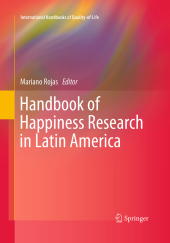 Neuerscheinungen 2016Stand: 2020-02-01 |
Schnellsuche
ISBN/Stichwort/Autor
|
Herderstraße 10
10625 Berlin
Tel.: 030 315 714 16
Fax 030 315 714 14
info@buchspektrum.de |

Mariano Rojas
Handbook of Happiness Research in Latin America
Herausgegeben von Rojas, Mariano
Softcover reprint of the original 1st ed. 2016. 2016. xi, 637 S. 254 mm
Verlag/Jahr: SPRINGER NETHERLANDS; SPRINGER 2016
ISBN: 9401779945 (9401779945)
Neue ISBN: 978-9401779944 (9789401779944)
Preis und Lieferzeit: Bitte klicken
This book presents original happiness research from and about a region that shows unexpectedly high levels of happiness. Even when Latin American countries cannot be classified as high-income countries their population do enjoy, on average, high happiness levels. The book draws attention to some important factors that contribute to the happiness of people, such as: relational values, human relations, solidarity networks, the role of the family, and the availability and gratifying using of leisure time. In a world where happiness is acquiring greater relevance as a final social and personal aim both the academic community and the social-actors and policy-makers community would benefit from Happiness Research in Latin America.
Chapter 1. Happiness, Research, and Latin America; Mariano Rojas.- Part I. The Relevance of Latin American Happiness.- Chapter 2. The Singularity of Latin American Patterns of Happiness; Pablo Beytía.- Chapter 3. The Social Psychology of Latin American Happiness; Jorge Yamamoto.- Chapter 4. The Relevance of Happiness: Choosing Between Development Paths in Latin America; Mariano Rojas.- Chapter 5. Trends and Challenges for the Research of Happiness in Latin America; Emilio Moyano Díaz.- Part II. Human Relations and Happiness in Latin America.- Chapter 6. The Importance of Relational Goods for Happiness: Evidence from Manizales, Colombia; Liliana Velásquez.- Chapter 7. "Like the zompopito": Social Relationships in Happiness among Rural and Indigenous Women in Nicaragua; Jéssica Martínez Cruz and Haydeé Castillo Flores.- Chapter 8. Aging, Family Relations and Well-Being in Chile; María Soledad Herrera Ponce, María Beatriz Fernández, and Carmen Barros.- Chapter 9. Happiness and Social Capital: Evidence from Latin American Countries; Francisco Mochón Morcillo and Rebeca De Juan Díaz.- Chapter 10.From the Individual to the Romantic Relationship: In Search of Happiness; Rozzana Sánchez Aragón and Ricardo Diaz Loving.- Chapter 11. The Role of Relational Goods in the Relationship Between Illnesses and Satisfaction in Latin America; Mariano Rojas and Maikol Elizondo-Lara.- Part III. Material Conditions and Happiness in Latin America.- Chapter 12. How the Economy Affects Happiness. Empirical Findings from Argentina; Dardo Ferrer and Victoria Giarrizo.- Chapter 13. Relative Income and Job Satisfaction in Chile; Rodrigo Montero and Tomás Rau.- Chapter 14. Food-Deprivation and Subjective Well-Being in Latin America; Jorge Guardiola and Mariano Rojas.- Chapter 15. Threats to Happiness: How Lower Middle Class Households Deal with Insecurity and Precariousness; Daniel Vera, Christian Suter, and Monica Budowski.- Chapter 16. Income, Sex, Pills and Relationships: An Empirical Study for Argentina; Pablo Schiaffino and Martín Tetaz.- Chapter 17. Using Life Satisfaction Data to Identify Urban Problems, Prioritize Local Public Expenditures and Monitor the Quality of Urban Life; Eduardo Lora.- Part IV. Social Factors and Happiness in Latin America.- Chapter 18. Sociopolitical Dimensions of Subjective Well-Being: The Case of Two Mexican Cities; René Millán.- Chapter 19. Does Migration Cause Unhappiness or Does Unhappiness Cause Migration? Some Initial Evidence from Latin America; Carol Graham.- Chapter 20. Disparities in Subjective Well-Being by Socioeconomic Status in Colombia; David Hurtado.- Chapter 21. Individual and Social Dimensions of Subjective Well-Being: Evidence across Latin American Countries; Victoria Ateca Amestoy, Teresa García Mu¤oz, and Ana Moro Egido.- Chapter 22. Psychological and Social Determinants of Subjective Well-Being in Mexico: Poverty, Class Identification and Social Mobility; Joaquina Palomar Lever and Amparo Victorio Estrada.- Chapter 23. Happiness Inequality in Latin America and The Caribbean; Nestor Gandelman.- Chapter 24. Does the Chilean Pension Model Influence Life Satisfaction? A Multilevel Longitudinal Analysis; Esteban Calvo.- Chapter 25. Does Values Education Make a Difference on Well-Being? A Case Study of Primary Education in Chiapas; Paola Cubas Barragán.- Chapter 26. Happiness and Quality of Life in Mexico: Geographical Considerations; José de Jesús García Vega.- Part V. Health and Happiness in Latin America.- Chapter 27. The Determinants of Mental Health: Empirical Evidence from Chile; Ramón Florenzano and Francisca Dussaillant.- Chapter 28. Pain, Emotions, and Social-Well-Being in Mexico; Benjamín Domínguez-Trejo, Gerardo Montero Ruvalcaba Palacios and María López Lena.- Chapter 29. The Impact of Economic Growth on the Prevalence of Health Problems in Latin America; Maikol Elizondo-Lara and Mariano Rojas.- Part VI. The Importance of Subjective Well-Being Indicators.- Chapter 30.


